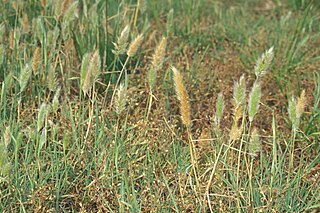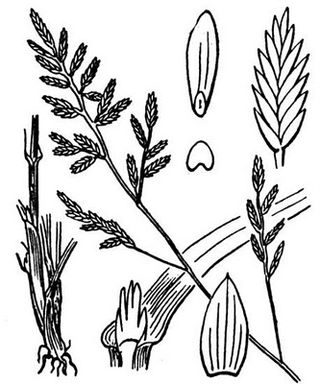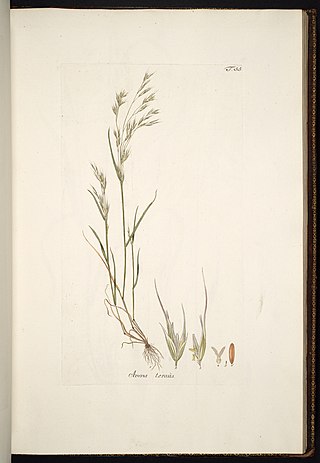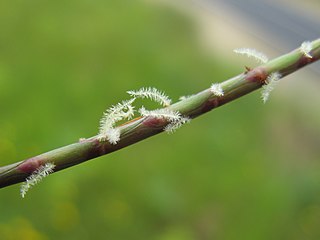
Lamarckia is a Eurasian and African plant in the grass family.

Aegilops is a genus of Eurasian and North American plants in the grass family, Poaceae. They are known generally as goatgrasses. Some species are known as invasive weeds in parts of North America.

Ehrharta is a genus of plants in the grass family.

Deschampsia is a genus of plants in the grass family, commonly known as hair grass or tussock grass. The genus is widespread across many countries.

Triodia is a large genus of hummock grass endemic to Australia. The species of this genus are known by the common name spinifex, although they are not a part of the coastal genus Spinifex. Many soft-leaved Triodia species were formerly included in the genus Plectrachne. Triodia is known as tjanpi (grass) in central Australia, and have several traditional uses amongst the Aboriginal Australian peoples of the region.

Bothriochloa is a common and widespread genus of plants in the grass family native to many countries on all inhabited continents and many islands. They are often called beardgrass, bluegrass or bluestem. Some species are invasive in areas where they have been introduced.

Lepturus is a genus of plants in the grass family, native to Asia, Africa, Australia, and various islands in the Indian and Pacific Oceans.

Polypogon is a nearly cosmopolitan genus of plants in the grass family, commonly known beard grass or rabbitsfoot grass.

Apera is a small genus of annual grasses, known commonly as silkybent grass or windgrass. They are native to Europe, North Africa and parts of Asia but have been introduced and naturalized in much of North and South America.

Gastridium is a genus of plants in the grass family. Species of the genus are found in Africa and Eurasia. These grasses are sometimes called nit grass.

Hainardia is a genus of coastal plants in the grass family, native to the Mediterranean Basin.

Leersia is a genus of plants in the grass family which includes species known generally as cutgrasses.

Parapholis incurva is a species of grass native to Europe, Asia and northern Africa, and widely naturalised elsewhere. Common names include coast barbgrass, curved sea hard grass, curved hard-grass, sicklegrass, curved sicklegrass and curved parapholis.

Pholiurus is a genus of Eurasian plants in the grass family. The only known species is Pholiurus pannonicus, found in a region stretching from Austria to Kazakhstan.

Catapodium is a genus of Eurasian and North African plants in the grass family.

Ventenata is a genus of plants in the grass family, native to Europe, North Africa, and central + southwest Asia. One species, Ventenata dubia, is considered an invasive weed in many places.

Hemarthria is a genus of herbaceous plants in the grass family. They occur in the tropical and subtropical Old World, especially in China and Southeast Asia, with some species in Africa, Australia, and Southern Europe. They may be known generally as jointgrasses.
Danthonidium is a genus of Indian plants in the grass family. The only known species is Danthonidium gammiei, native to the State of Maharashtra in India.

Catapodium rigidum, ferngrass, is a species of annual grass in the family Poaceae, distributed around the Mediterranean and the Middle East. It has been widely introduced throughout drier parts of the world, including parts of North America, South America, South Africa, Korea, Australia, and New Zealand. Individuals can reach 20 cm (8 in).
Parapholis filiformis is a species of annual herb in the family Poaceae. They have a self-supporting growth form and simple, broad leaves. Individuals can grow to 0.17 m.


















